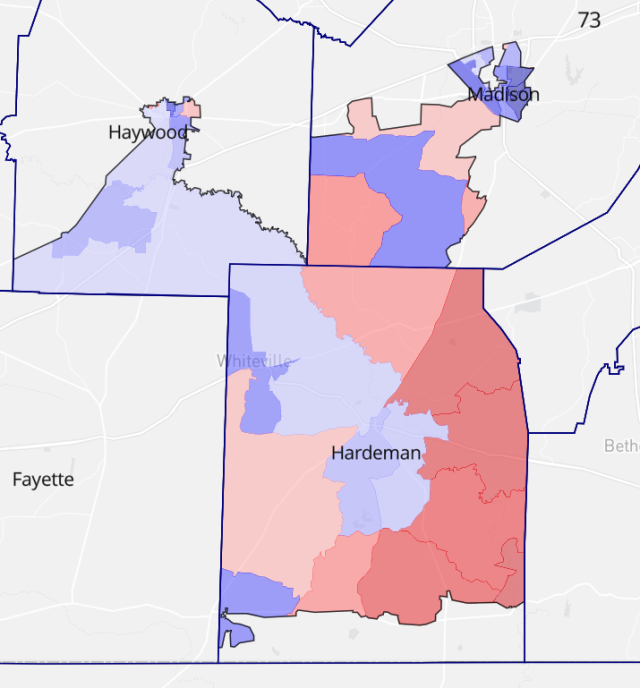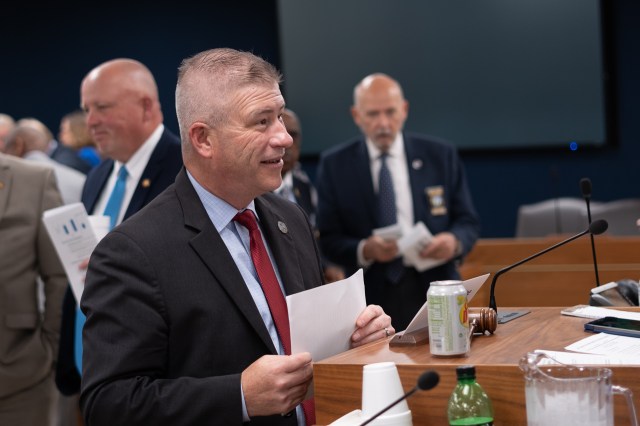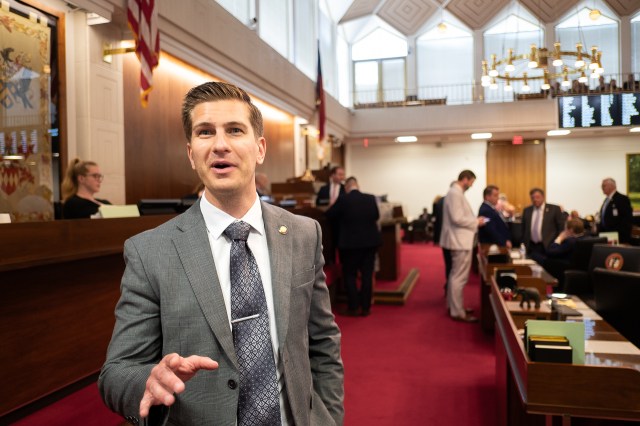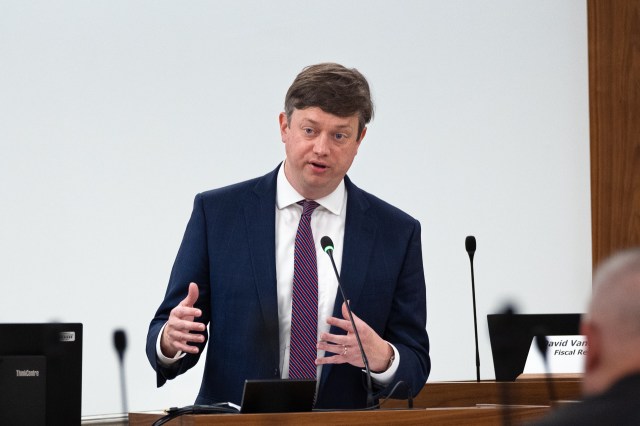You Don’t Say
“The good news is, unlike a lot of states, we’re not sitting here looking at a giant hole that we have to fill.”
House speaker Tim Moore, on his view of the legislative inability to pass a new budget. (WRAL News, 6/28/24)
Session End
Will Doran, WRAL News, 6/28/24
The final days of North Carolina’s 2024 legislative session saw what had been a relatively unproductive affair end in a torrent of action, drama and confusion. The legislature last week passed 33 bills — most of them on Thursday, the final day of votes.
At times, lawmakers appeared to have only a vague idea of what they were being asked to vote on as the House and Senate were quickly amending bills and shuffling them between one another for final approval.
At one point Thursday the Senate sent the House a new version of a bill containing a slew of public health policy changes. Democratic Rep. Pricey Harrison, D-Guilford, asked if one of her Republican colleagues could explain what the new version would do — or if the House could take a three-minute break to let lawmakers read the bill they had just been asked to vote on.
House Speaker Tim Moore declined to allow a break. And the bill’s House lead, Rep. Larry Potts, R-Davidson, declined to answer Harrison’s question about what it would do.
The bill then passed, in a bipartisan 104-7 vote. It’s now on Democratic Gov. Roy Cooper’s desk to sign or veto. Senate Bill 425 appears to change the rules for county health directors, surrendering an unwanted newborn, trauma assessments of children in foster care, prison inmates and Medicaid benefits, security risk assessments for hospitals, and more.
Once that vote passed following Moore’s refusal to break for three minutes to let lawmakers read the bill, Moore then immediately announced the House would take a 15-minute break so lawmakers could look over and privately discuss a different bill.
Yet another bill removes hundreds of acres of land from Summerfield, a Greensboro suburb, at the request of a real estate developer who has been upset at the town council for not approving his proposed housing project. House Bill 909 passed Thursday without that proposal ever being vetted through any committee in the House of Representatives.
That’s a steep departure from legislative norms. Even several Republican lawmakers spoke out on the House floor to oppose the process, in a rare show of public defiance of GOP leadership.
“The Senate sends a bill over and everybody says, ‘This is just the way we do business,’” said Rep. Ben Ross, R-Richmond. “But folks … let’s do this the right way.”
“It has not been vetted, we have not had a chance to discuss it, nothing,” said Rep. Stephen Ross, R-Alamance, who predicted passing the bill would set a bad precedent for any local government anywhere in the state. The bill passed, but with a substantial number of members from both parties opposed.
Other bills passed with less controversy, receiving unanimous or near-unanimous support in both chambers:
- A constitutional amendment proposal, to reaffirm the state’s existing rules that only citizens can vote.
- A first-ever legal definition of antisemitism.
- A proposal to boost child care funding by nearly $68 million.
- A slew of changes requested by the DMV, including new digital driver’s licenses that could be stored on mobile devices.
- A bill to crack down on many of the vaping products sold in North Carolina.
- A new version of the annual Farm Act — almost always a contentious, highly partisan issue — passed unanimously in both chambers.
- Todd Brown, a veteran Charlotte corporate attorney, will be named to the North Carolina Business Court. He’ll be the first Black judge to serve on that court in years.
But as much as the session will be defined by any new laws that come out of it, it was also notable for what lawmakers failed to accomplish. Although Republicans hold a veto-proof supermajority in both chambers, they were unable to pass a new budget — the top priority of any legislative session.
Moore and his counterpart in the Senate, Sen. Phil Berger, each cast blame on the other for the failed budget negotiations. But they also expressed optimism for the Republican-led legislature’s ability to govern in the future, despite the numerous snags they hit this year.
“We continue to grow faster than just about any other state in the nation,” Berger told reporters Thursday. “In the next Census, in my opinion, we’re going to leapfrog Georgia and Ohio [and] become the seventh most populous state. I think anybody that objectively looks at that record would say that this state is well managed, and the policies adopted by this legislature … have been a net positive for the people in the state of North Carolina.”
Moore offered a similarly sunny view of the future: “The good news is, unlike a lot of states, we’re not sitting here looking at a giant hole that we have to fill,” he said when asked about the failure to pass a new budget. “We have a surplus. We have a surplus that is there because we have budgeted wisely. We have cut taxes. We have reduced regulations. And North Carolina is growing at a rate it has never seen before.”
The biggest loss for conservatives this year was the failure of a plan to add nearly half a billion dollars more to the state’s private school tuition voucher program.
Berger and Moore each agreed on that plan, but Moore said he would only pass it with additional raises for public school teachers. His plan proposed spending about four times as much on vouchers as on teacher raises. But Berger was strictly opposed to any further raises. So that deal — and with it, the entire budget process — fell apart.
In addition to failing to pass a budget adjustment to address the state’s $1 billion budget surplus for the fiscal year that begins Monday, the legislature also failed to pass four of the five constitutional amendments GOP leaders suggested putting on the ballot this November.
After some House Republicans failed to show up for the final days of voting, and GOP leaders were unable to win over any support from Democrats for most of their ideas, the only amendment that ended up passing was the citizen-only voting proposal.
Other notable bills also failed to make it across the finish line:
- The House never voted on a bill the Senate passed in early May — and which both chambers passed in two previous years, only to be foiled by Cooper’s vetoes — that would force sheriffs to work with federal immigration officials.
- For the third straight year, the Senate passed a medical marijuana legalization bill with broad bipartisan support, but the House refused to allow it to be voted on.
- A wide-ranging social services reform attempt passed the Senate but not the House.
- The House, but not the Senate, approved a bill to pay churches and other religious institutions to provide mental health or substance abuse services, starting with a pilot program in Vance and Granville counties.
- A change to the rules for broadband internet expansion grants passed the House but not the Senate.
Both chambers also tried advancing last-minute changes to the state’s election laws ahead of this year’s key political races. But the House and Senate identified different priorities, and neither finished its work quickly enough for the other chamber to give potential approval. But some of the ideas might still be alive. Sen. Warren Daniel, R-Burke, is a top election law official in the Senate. He told WRAL last week that he expected his bill to be looked over by House GOP election law officials this summer, when they would add in their own ideas and send it back to the Senate for a final vote.
The legislature plans to now come back occasionally, mainly so that lawmakers can attempt overriding any vetoes Cooper issues in the next few days over any of the three dozen bills that just hit his desk.
They could also use those brief returns to pass some of the laws that didn’t quite make it over the finish line this month — and possibly even take a second crack at new constitutional amendments, as long as they don’t wait too long. Voting begins in September for this November’s general election. [Source]
Redistricting Lawsuit
Gary D. Robertson, The Associated Press, 6/29/24
North Carolina trial judges have dismissed a lawsuit challenging redrawn legislative and congressional district lines on the argument that they run afoul of an indirect constitutional right to “fair elections.” The judges said a recent affirmation still applies — that redistricting policy decisions are left to the General Assembly, not the courts.
In an order released Friday, the panel of three Superior Court judges threw out the complaint filed in January by several voters who attempt to block enforcement of redistricting that they said creates outsized preferences that favor one side — in this case benefitting Republicans.
In a 2023 ruling by the state Supreme Court, the GOP majority said the judiciary lacked authority to declare redistricting maps as illegal partisan gerrymanders. They also said that redistricting was a political matter the judicial branch must stay out of, save for challenges on specific limitations.
A voters’ lawyer argued in a court hearing earlier this month that the 2023 decision didn’t apply to his lawsuit, which described an implicit though unspecified right within the state constitution to fair elections. The lawsuit cites specific language in the constitution that “elections shall be often held” and that “all elections shall be free.”
But the order signed by Superior Court Judges Jeffery Foster, Angela Puckett and Ashley Gore reads that the 2023 opinion by the Supreme Court still controls the outcome in this case. That’s the argument also made by Republican legislative leaders who were among the lawsuit defendants.
“The issues raised by Plaintiffs are clearly of a political nature,” the order dated Thursday said. “There is not a judicially discoverable or manageable standard by which to decide them, and resolution by the Panel would require us to make policy determinations that are better suited for the policymaking branch of government, namely, the General Assembly.”
Attorneys for the plaintiffs said Saturday they anticipate filing an appeal. In a written statement, the lawyers added the ruling that “the legislative manipulation of voters to create essentially preordained election results” is beyond the authority of courts to address in part creates a result that “if correct, is a devastating blow to the democratic process of elections in North Carolina.”
Spokespeople for state House Speaker Tim Moore and Senate leader Phil Berger did not respond Friday to a request for comment.
The lawsuit is among four filed in North Carolina to challenge congressional and legislative boundaries drawn by the GOP-dominated General Assembly last fall for use in elections through 2030 that favor Republicans electorally. The other three, still pending, were filed in federal court and focus on claims of illegal racial gerrymandering. The “fair elections” lawsuit focuses on a handful of districts. Each of the three judges who heard the lawsuit are registered Republicans. Chief Justice Paul Newby, a Republican who wrote the prevailing opinion in the 2023 redistricting ruling, chooses three-judge panels to hear such cases. [Source]
School Calendars
T. Keung Hui, The News & Observer, 6/28/24
“Under protest,” school leaders in a popular coastal tourism are dropping their plans this year to defy North Carolina’s school calendar law. The Carteret County school board approved Friday a new calendar for the 2024-25 school year that complies with state law by starting classes on Aug. 26. The board also dropped its appeal of a court order that had challenged the district’s efforts to not follow the calendar law.
The board’s decision came a day after a Superior Court judge rejected Carteret’s request to stay the June 5 court ruling that voided their plan to start classes on Aug. 13. Carteret County is home to popular summer beach tourism areas such as Atlantic Beach, Beaufort, Emerald Isle and Morehead City.
“We recognize that an appeal would take time, and we cannot hold our students and their families in limbo this summer over when the school year will start,” said school board member Dennis Goodwin. “Therefore under protest in compulsion of an order and judgment of the court and without waiving our position that the calendar statute is unconstitutional, I move the adoption of the attached calendar.”
As part of the vote Friday, the board said it would encourage individual board members and the superintendent “to explore all options to give our students equal opportunities” with those students in schools that don’t have to follow the calendar law.
State lawmakers have regulated school calendars for 20 years, since the tourism industry raised concerns about classes starting earlier in August. The state’s traditional public schools can’t open sooner than the Monday closest to Aug. 26 or close later than the Friday closest to June 11.
The calendar law doesn’t apply to private schools, charter schools, year-round schools and early college high schools.
Carteret County had been among 29 school districts cited in a recent state report as defying the calendar law. Statewide, a quarter of North Carolina’s school districts plan to ignore the school calendar law for the upcoming school year. [Source]
Tax Amendment
Richard Craver, Winston-Salem Journal, 6/28/24
A proposed constitutional amendment setting a cap on the personal income tax rate has the potential to impact North Carolinians’ daily lives by potentially limiting funds for everyday needs during an economic downturn. Senate Bill 630 would lower the personal income tax rate cap from 7% to 5%. It did not advance out of the legislature during Thursday’s final voting day of the 2024 regular session.
Republican bill sponsors of SB630, led by Senate leader Phil Berger, R-Rockingham, claim the proposed tax cut represents the latest in a series of efforts to let taxpayers keep more of their hard-earned money.
“Republicans have made tremendous progress in lowering taxes for North Carolina workers, families and business owners,” Berger said in a statement. “Now, we must preserve that progress by ensuring no future legislative body will raise taxes at a level that would erase those historical reductions and rob the wallets of North Carolinians, and better protect themselves from future government overreach.”
Opponents, meanwhile, claim the amendment would hamstring the state’s ability to respond and recover from severe economic downturns through raising tax revenues, as well as put an intended cap on spending on public education and other social initiatives.
Alexandra Sirota, executive director of the left-leaning N.C. Budget & Tax Center, said low-income taxes “are making it impossible for legislators to put together a budget that keeps up with the needs of the growing state.”
The center said that when the next corporate and personal income tax rates decrease takes effect in 2025, it will reduce state tax revenues by $1.4 billion in 2025, as well as by an estimated $13.4 billion through 2030.
The Senate cleared SB630 by a 30-13 vote Thursday on the final voting day of the 2024 regular session. However, the House shelved the bill by placing it in its gatekeeper Rules and Operations committee.
A supermajority is required in both chambers to pass bills containing constitutional amendments. Republicans hold just the necessary 72 seats in the House and 30 seats in the Senate for a supermajority.
Constitutional amendment bills are not subject to a governor’s veto. However, only a simple majority of voters is required for referendums on constitutional amendments to be enacted.
According to the Senate adjournment bill passed Thursday, the next time constitutional amendments could be addressed would be the planned Nov. 19-22 session after the general election.
In 2018, voters approved by a 57.3% to 42.7% margin a constitutional amendment reducing the personal income tax cap from 10% to 7%. However, the N.C. chapter of the NAACP sued in 2018 to challenge the constitutionality of the cap amendment and a voter-identification amendment. That litigation has not been settled.
At first glance, lowering the personal income tax cap from 7% to 5% appears potentially unnecessary given previous legislation passed by the legislature. The current rate is at 4.6%, down from 4.75% in 2023 and 4.99% in 2022. North Carolina currently has the 35th highest personal income tax rate. The rate is set to decrease to 4.5% in 2025 and 4.25% in 2026 before reaching a floor of 3.99% in 2027.
By comparison, the corporate rate is 2.5%, but is being phased down over the next six years until it goes away in 2023. North Carolina has the lowest corporate income tax rate in the country at 2.5% for states that have such a tax. The corporate tax collections comprise just 1.5% of the total state revenues, according to N.C. State University tax research.
The center said that “with this storm of bad (Republican) budget and tax policy currently swirling in our state, advocates, parents and organizations are coming together to raise concerns about the unmet needs and unsustainable position the state is in due to income tax cuts for profitable corporations and the wealthiest few.”
The center claims the constitutional amendment for the personal income tax cap would hamstring the state’s ability to raise taxes during an economic downturn.
The result could be the state being “unable to adequately support public K-12 education, the child care sector, and so many more systems that are suffering from chronic under-funding in North Carolina,” said Sally Hodges Copple, the center’s public policy analyst.
The N.C. chapter of the NAACP opposes lowering the personal income tax rate, saying it “would enshrine regressive policies into our Constitution that would starve our state of funds for things we all need, like public schools and environmental protection.”
The GOP-controlled legislature has passed over the past 11 years two tax-related bills that significantly altered how and what state tax revenues are collected. In 2013, legislators approved adding sales tax to admission tickets for most live entertainment events, motion pictures or films, museums, cultural sites, gardens, exhibits, shows or similar attractions or guided tours at any of these attractions.
In March 2016, North Carolina began collecting sales tax on labor for many installation, maintenance and repair services. Adding the 6.75% sales tax to labor was approved by the General Assembly in September 2015 as part of the 2015-16 budget. Republican legislative leaders said the expansion was designed to help offset $400 million in lost revenue from personal income tax cuts that went into effect in 2017.
The decision to add the sales tax to labor gave the state a guaranteed revenue stream because most people eventually needs repair and maintenance services.
The biggest consumer impact has been on auto repair and maintenance services, in part because labor often is the most expensive part of the bill. Also affected were labor for computer installation and repairs, along with installing modular homes.
Economists say low- to middle-income households have been more likely to feel the pinch of the labor sales tax since they are more willing, or have no good alternative, to nursing an aging vehicle through rounds of repairs. By comparison, economists say upper-middle to high-end households may opt to buy or lease a new car when maintenance and repair costs become a nuisance. [Source]
Bill Signings
Paul Specht, WRAL News, 6/28/24
Lawyers who are being investigated by the North Carolina State Bar now have more legal protections under the law. The Bar group is in charge of licensing, regulating and disciplining lawyers statewide. Critics of the Bar have said its investigations are sometimes politically motivated and its punishments can be too heavy-handed.
Democratic Gov. Roy Cooper on Friday signed Senate Bill 790, legislation that amends the investigation process and attempts to cut down on frivolous complaints. Prior to reaching Cooper’s desk, the GOP-led state Senate passed the bill 43-2 and the GOP-led state House of Representatives passed it 79-26.
Cooper signed four other bills:
- House Bill 223, which makes various changes to the state Human Resources Act and related laws. For instance, it eliminates a law blocking state agencies from filling a job until 21 days after the job listing had been posted.
- House Bill 495, which makes money laundering a felony and adjusts other laws to try to crack down on retail theft.
- House Bill 912, which allows UNC-Chapel Hill, UNC-Wilmington, East Carolina University, and Fayetteville State University to finance certain capital improvement projects without appropriations from the state’s general fund or infrastructure fund.
- House Bill 971, which modifies laws related to human trafficking, increases the punishment for soliciting a prostitute, and requires hotels and other lodging establishments to develop human trafficking awareness training. [Source]
Debate Reaction
The News & Observer and WTVD News, 6/29/24
President Joe Biden delivered the speech, Friday afternoon, in Raleigh, that many political pundits said he needed following Thursday night’s debate against former President Donald Trump. At a campaign rally that had become a high-pressure, can-he-do-the-job crucible, Biden needed to reassure his supporters he was up to the challenge.
“It was like night and day,” Durham Mayor Leonardo Williams told The N&O in a phone interview Friday. “The energy he had on the Tarmac, the energy he had at the watch parties is the energy I wish he had on stage.” Raleigh Mayor Pro Tem Jonathan Melton was among the first to greet the president at the airport. He said Biden was “energetic and engaged” and spent around 30 minutes talking with supporters. “He did not look like someone who was tired,” Melton said.
It was in sharp contrast to his Thursday night appearance, where he came across as weak, with his voice hoarse, often hard to hear and his thoughts sometimes meandering and his sentences trailing off.
Biden’s said 2,000 people attended the mid-day event at the Jim Graham building at the North Carolina State Fairgrounds. Biden was coming off more than a 12-hour news cycle criticizing his performance on stage Thursday night at a debate, hosted by CNN. For his part, Biden took to the stage and addressed the debate, avowing that he could still do the job of president.
“I know I’m not a young man,” Biden said. “I don’t walk as easily as I used to. I don’t speak as smoothly as I used to. I don’t debate as well as I used to, but I know what I do know. I know how to tell the truth. I know right from wrong and I know how to do this job. I know how to get things done.”
“Donald Trump will destroy democracy and I will defend it,” Biden said. “So folks, are you with me?”
Several calls and emails to more than a dozen local and state Democratic leaders, donors and strategists by reporters at The News & Observer went unanswered Friday as Biden prepared to take the stage in Raleigh. U.S. Rep. Jeff Jackson, for example, who is running for North Carolina attorney general, had no comment when his campaign was reached by a reporter Friday. But many who did speak with The N&O throughout the day said the president’s performance did not shake their faith in his ability to lead.
And a mix of Democratic leaders on the state and local level appeared alongside the president as he arrived in North Carolina and — like Attorney General Josh Stein and Gov. Roy Cooper — were in the crowd or rallied the audience in advance of the speech. Senate Minority Leader Dan Blue and a gaggle of mayors, city council members and county commissioners were among the supporters when the Bidens arrived at Raleigh-Durham International Airport just before 2 a.m. Friday.
Democratic Charlotte City Councilman Malcolm Graham offered a blunt assessment of Biden’s debate performance, saying the president “did not perform very well.” “Our candidate picked the wrong day to have a bad day,” said Graham, who has campaigned for Biden this election cycle.
Melton dismissed criticisms of the president’s age. Given that his opponent is just three years younger, the age difference is “splitting hairs.” What’s more important, he said, is the candidates’ character and where they stand on the issues. “The fact that Donald Trump would not disavow Jan. 6, the fact that he would not give a clear answer on women’s rights to health care, he wouldn’t give a clear answer on child care — these are really important issues to voters,” Melton said.
North Carolina Republicans seized the opportunity to intensify criticism of the president. In a post on X, GOP Lt. Gov. Mark Robinson bashed his gubernatorial opponent’s backing of Biden. “After last nights debate, how can he still support a man who is so clearly unfit to be commander-in-chief?” Robinson posted, accompanied by an image of Stein at the podium. Fellow Republicans echoed that message throughout the day.
“America saw the real Joe Biden last night: a weak, failed, dishonest man who has no business leading our country for the next four months, let alone the next four years,” NC GOP spokesperson Matt Mercer said in a statement. “Today in Raleigh, Democrats must confront the fact their nominee for president is wrong on policy, wrong on facts, and simply the wrong choice for a strong America.”
Republican National Committee Chair Michael Whatley, who formerly chaired the state party, said in a statement that Biden’s “weak performance” at the debate means he has no chance of winning the Tar Heel State. “And a rally won’t repair the damage done to his flailing campaign on the world stage,” Whatley said in a statement. “The entire country, including my home state, knows that President Trump is the best candidate whose America First policies will make us great again.”
At the national level, amid questions of Biden’s age and ability, some wonder if he should be replaced. While it is possible at the party convention, it’s a rare and risky political move.
“In recent years we really haven’t seen it happen both of the parties have tended to lock in their candidates fairly early on,” said Mitch Kokai with the John Locke Foundation.
But if that were to happen, some names are already being floated. Axios reports one senior House Democrat floated 5 governors as potential candidates – Gretchen Whitmer from Michigan, Gavin Newsom from California, Josh Shapiro from Pennsylvania, Tim Walz from Minnesota, and North Carolina Gov. Roy Cooper.
Experts say Cooper checks a lot of boxes – He’s the Governor of a key swing state with high approval ratings and a Democrat who can win tough races in a Southern state – including both times in 2016 and 2020 when he won his races for Governor even when Trump won North Carolina on the same ballot.
“They see North Carolina as a state they’d like to have, they see a guy who’s won in North Carolina, they say look this could be good for the ticket nationally and it could be good for bringing those 16 electoral votes to Democrats,” Kokai said. But unless things change, for now, Cooper and others making it clear, that they’re sticking with Biden to be the one to try and make that happen. [Source 1] [Source 2] [Source 3]
Court Vacancies
Julia Coin, The Charlotte Observer, 6/28/24
Three open seats on North Carolina’s federal bench have paved the way to diversify the robed group of judges overseeing thousands of cases in U.S. district courts each year. But GOP Sens. Thom Tillis and Ted Budd aren’t focused on filling the state’s vacancies, some of which have sat unaddressed for two years.
There are two openings for U.S. District Court judgeships in North Carolina’s western district. One has been open for two years and the second for one year. Typically, each state’s two United States senators work with the White House to get nominees confirmed by the Senate. But in North Carolina, things have been at a stalemate.
Daniel Keylin, communications director for Tillis, did not answer questions from The Charlotte Observer about why seats for the U.S. District Courts for the Western District and Middle District of North Carolina have remained open.
Instead, Tillis and Budd in a joint email statement addressed only a new vacancy on the Fourth Circuit Court of Appeals. Tillis, in an interview with Politico last month, said he had “no intention of even discussing” filling district court vacancies until the Fourth Circuit question was resolved.
“The advice and consent judicial nominations process was designed by the Founding Fathers and we take the responsibility very seriously,” Tillis and Budd wrote in the statement to the Observer. “While we have not yet been able to reach a consensus choice with the White House for the Fourth Circuit vacancy, we will continue our discussions in good faith to identify and agree upon a nominee.”
The chance to diversify Charlotte’s federal bench has long been bogged down by politics, and in a presidential election year the delays continue. With the clock ticking on this year’s legislative calendar, it’s unlikely any position will be filled before 2025.
The spotlight shifted to filling the Fourth Circuit vacancy when Judge James Wynn Jr. in January announced plans to step down. In North Carolina’s U.S. district courts, several judges had already announced anticipated moves to senior status, which create vacancies and set off the scramble to find a replacement, according to the United States Courts website.
U.S. Middle District Judge Catherine C. Eagles, at the beginning of this year, declared she will be on senior status at the end of December.
In 2022, U.S. District Judge Max Cogburn, a Western District judge out of Asheville, said he will move to senior status as soon as his replacement is named. Another seat in the Western District of North Carolina has already sat open for a year following Charlotte-based U.S. District Judge Bob Conrad’s 2023 move to senior status.
In the Western District, which includes growing urban areas like Charlotte, Asheville, Gastonia and Statesville, only white men have served as trial judges.
Of the country’s 94 federal court districts, only three others share that distinction — and none come close to having the population and diversity of North Carolina’s Western District.
Nationally, 70% of federal judges are white and 60% are men. Former prosecutors outnumber public defenders 4 to 1, according to the National Association for Public Defense.
Appointment delays could result in case backlogs, said John Wester, a Charlotte lawyer and former president of the North Carolina Bar Association. While the district court vacancies haven’t created judicial emergencies and unmanageable caseloads like those in California, Florida and Texas, they have left many wondering why the senators and the White House have been unable to usher in at least one candidate for so long, especially when a man described as one of the “most qualified candidates” in the pool’s history is available.
U.S. Magistrate Judge David Keesler, a Charlotte-based Democrat, has long had bipartisan support, the Observer previously reported. The former Morehead scholar at the University of North Carolina at Chapel Hill was a state and federal prosecutor who has served as a federal magistrate for almost 20 years.
“He reflects the highest standard for judges,” Wester said. “We need to get someone this good, because they don’t come along that often.”
Dena King, the U.S. attorney for the Western District of North Carolina, was another front-runner in filling the court’s open seat, the Observer previously reported. If appointed, King would become the first woman and minority to serve as a trial judge on the 150-year-old court. But that pairing leaves North Carolina’s two Republican senators with two Democratic nominees.
Federal Magistrate Judge Susan C. Rodriguez has been floated as a possible contender. The Republican served as a legal policy adviser at the Department of Homeland Security and in 2005 worked in the White House Office of the General Counsel managing judicial nominations and assisting with responses to congressional investigations.
While President Joe Biden must first nominate judicial replacements before senators approve them, congressional recommendations typically roll into the White House. The process is largely veiled.
Tillis told Politico the White House tried to “jam” him on a Fourth Circuit nominee, but Biden’s administration maintained it had asked for Tillis’ input on every vacancy. The Biden administration previously pressed Senate Democrats to exceed the number of judges appointed by former President Donald Trump, and last month, the Senate did by confirming the 200th federal judge since Biden took office.
“The success Biden has had around the country getting judges nominated and confirmed by the Senate is extraordinary,” said Bill Taylor, a D.C. lawyer who follows N.C. politics. “But it’s equally extraordinary that nothing’s happening in North Carolina.” [Source]
Supreme Court Decision
Lucas Thomae, Carolina Public Press, 6/28/24
A landmark U.S. Supreme Court decision last week reaffirmed that it does not violate the Second Amendment to prohibit people accused or convicted of domestic violence from owning firearms.
The decision in United States v. Rahimi, which the court announced on June 21, is notable for what it could have done but did not do — namely, strike down laws aimed at protecting abuse victims from gun violence. Had that happened, North Carolina‘s laws requiring people with domestic violence protective orders against them to surrender their firearms to law enforcement could have been deemed unconstitutional.
Because the court upheld the federal law on the same principle, the state’s laws appear to be here to stay, and any local authorities who cited concerns about constitutionality when exercising not to enforce such gun seizure court orders fully no longer have that rationale.
Federal law prohibits people convicted in any court of a “misdemeanor crime of domestic violence” to possess or purchase firearms and ammunition. People subject to certain domestic violence protective orders are similarly denied access to guns and ammo.
The federal ruling leaves the door open for North Carolina and other states to provide additional protection to those threatened by domestic violence by enacting stricter gun control measures against people who are already a violent threat to those in their own families.
Chapter 50B of North Carolina’s General Statutes addresses domestic violence, laying out a procedure for the required surrender of firearms by a person accused of domestic violence.
The North Carolina Domestic Violence Commission, a state body made up of appointees from the governor, approved a legislative agenda ahead of the 2023 long session that outlined several legislative goals for the near future. Among those goals was to enact extreme risk protective orders, a type of protective order that can be sought by family members or law enforcement to temporarily disarm people who pose a significant risk of harming themselves or others with a firearm.
A group of Democratic representatives filed a bill in 2021 to adopt ERPOs, but it died in the House Rules Committee and has not been picked back up since, despite the 2022 Bipartisan Safer Communities Act authorizing the use of federal grants to implement ERPO programs.
More recently, Sen. Jay Chaudhuri, D-Wake, introduced a bill on April 30 to make it illegal for people convicted by a state court of a misdemeanor crime of domestic violence from owning or purchasing firearms. Thirty-four other U.S. states and D.C. currently have such a law in place. That bill hasn’t seen any movement since it was referred to the House Rules Committee on May 1. [Source]
Flounder Closure
Gareth McGrath, USA Today Network, 6/30/24
With flounder off the fishing table for the time being, North Carolina’s recreational fishermen are turning to legislators in Raleigh to see about winning permission to cast for arguably the state’s most popular game fish. In May, the N.C. Division of Marine Fisheries dredged up a firestorm by announcing that there would be no recreational flounder season in 2024.
The move comes after years of smaller and smaller windows for recreational fishermen to catch the popular fish, culminating in last year’s short two-week harvest window. But officials said even that short fishing period was too much for the already depleted flounder fishery.
“Estimates from 2023 indicate the recreational catch exceeded the quota allowed under a stock rebuilding plan that was included in Amendment 3 to the Southern Flounder Fishery Management Plan and adopted by the N.C. Marine Fisheries Commission,” stated a marine fisheries’ release.
The move, regulators hope, will help the state’s struggling flounder stocks rebound after years of overfishing and an intense war of words between commercial and recreational anglers as to who is to blame for the fishery’s woes.
But the decision, albeit one most scientists believe is the right move if the state is serious about a long-term recovery for the fishery, has left recreational fishermen − who never had to deal with a closed flounder season until 2019 − frustrated and angry.
Adding fuel to the fire are the policies of neighboring states that have much less stringent rules when it comes to flounder. In South Carolina, for example, recreational fishermen are allowed to catch up to five flounder a day, 10 per charter boat.
The result has been the launch of several grassroots efforts to pressure the N.C. General Assembly, which funds marine fisheries, to allow some sort of recreational fishing season this year.
One of those efforts is headlined by the Ocean Isle Fishing Center, which in the past advocated successfully to get menhaden fishing banned from just off Brunswick County’s beaches − a move that was later extended statewide.
“We are not scientists, so we are not going to argue the science (marine fisheries) uses to make its decisions. We are boots on the ground fisherman, and our experience shows us (marine fisheries) is in outer space in terms of the health of the fishery, both flounder and red snapper,” the fishing center stated in a June 17 letter to the N.C. Wildlife Resources Commission thanking the commission for coming out against the closure of the 2024 recreational season in coastal waters.
The wildlife commission manages the flounder fishery in the state’s inland waters and some waters jointly managed with marine fisheries. The agency is currently accepting public comments to see if it should open the waters it manages for a limited recreational flounder season this year.
With lawmakers in Raleigh mired in budget discussions and eager to end the short session and head home for the summer, it isn’t known how successful any legislative effort to force the state to open a recreational flounder season in 2024 will be. The two-week 2023 season ran Sept. 15-29. [Source]
Hospital Future
Jane Winik Sartwell, Carolina Public Press, 6/29/24
July could serve as an important turning point in the saga of HCA and Mission Health. Affiliated Monitors’ series of public meetings concerning HCA’s hospitals across Western North Carolina wrapped up recently. The deadline for Dogwood Health Trust to deliver its opinion to the NC Attorney General’s office about whether HCA breached its Asset Purchase Agreement is fast approaching.
Less than a week remains until the contract expiration date of Mission Health’s nurses. Mission Health is a group of six hospitals and related medical facilities in Western North Carolina, the biggest of which is in Asheville. The other five hospitals are in small towns in nearby mountain counties.
HCA, which stands for Hospital Corporation of America, bought Mission Health from its previous nonprofit owner in 2019 for $1.5 billion. The Tennessee-based for-profit corporation’s operation of the hospitals has garnered much criticism.
HCA’s acquisition of Mission Health resulted in the creation of the Dogwood Health Trust, to hold the $1.5 billion HCA paid to the nonprofit, for use in philanthropic endeavors in Western North Carolina. Dogwood was also tasked with hiring an independent monitoring company to assess whether HCA is abiding by the purchase terms it agreed to back in 2019.
A new monitoring company, Affiliated Monitors, came on board earlier this year. The previous monitoring company, Gibbins Advisers, deemed HCA compliant each year, even as tensions between HCA and its employees, as well as the communities which it serves, rose to a boiling point.
After their first rally in early June, the Asheville nurses’ union went back to the bargaining table with HCA. This session resulted in agreements on updated uniforms and expanded health care benefits for LGBTQ+ nurses, Elle Kruta, Mission Health nurse and member of the union’s bargaining team, told Carolina Public Press.
However, this agreement did not fully satisfy union members. “The hospital is still refusing to budge on really any of the demands that nurses have to make our hospital safer,” Chris Letts, a Mission Health nurse who identifies as nonbinary and uses they/them pronouns, told CPP.
The nurses’ union in Asheville, which is part of the nationwide organization National Nurses’ United, staged a second rally outside of Mission Health on June 19. “We will keep working at the negotiating table even after the contract expires, but nurses are fired up and ready to use everything at our disposal, and that could include a strike if we need to,” Letts said after the second rally.
If a plan to strike does materialize, the bargaining team will announce a strike authorization vote. If nurses vote in favor, the union must provide a 10-day notice to management before any work stoppage. [Source]
Southport Surroundings
Caroline Horne, Port City Daily, 6/28/24
A House bill cutting Southport’s authority over planning and development in surrounding areas passed Thursday. Though some residents and officials support it, others do not, some even filing a petition against the move.
As of Monday, “No High Density Southport” garnered 500 signatures, with the petition asking Sen. Bill Rabon and Rep. Charlie Miller to withdraw the bill.
“This legislation would be devastating for the city and its outlying areas, resulting in unchecked development, clearcutting and environmental damage to one of the last remaining jewels in Brunswick County,” the petition states.
Brunswick County residents are concerned it will lead to rampant construction in a county where the planning board has the final say over development; development plans only go to commissioners in Brunswick County if appealed. The petition is now closed since House Bill 911 — filed on May 8 as H.B. 1064 — passed 89 to 21 in its third reading Thursday. It was ratified Friday and goes to the governor for a signature.
The bill will take away Southport’s extraterritorial jurisdiction. An ETJ is the legal ability of a government or municipality to exercise authority beyond its corporate boundaries.
The passing of the bill will officially remove residences from Smithville Woods and Jabbertown Road, located beyond the city limits, from the rules and regulations of Southport’s planning board.
Effective July 1, all development proposals within previous ETJ areas will now go to the Brunswick County planning board, instead of through both the Southport planning board and board of aldermen. Brunswick County’s single-approval process is intended to streamline the development process for the county, though some residents argue this process only benefits developer interests.
Brunswick is one of roughly a dozen counties statewide that allows its planning board final development decisions. By contrast, in New Hanover County, the planning board must get recommendations approved by commissioners before development can begin.
Though the nearly 2,000 acres of land and 809 properties surrounding Southport are largely nature, Southport residents and city officials fear not having control over the land will open the doors to unwanted development in areas many people see as necessary provisions for greenery and wildlife.
“The county is putting development before its citizens and it’s making a major negative impact to the quality of life in our area,” signer Melanie Carballo wrote in the “No High Density Southport” petition. “Southport is one of the last areas with beautiful trees and charm, but there is so much development going on it makes it hard to get to.” [Source]
Disability Response
Rose Hoban, NC Health News, 6/28/24
This past week, people with disabilities from Minnesota, Texas, Pennsylvania, Massachusetts, Kansas and other states loaded up their wheelchairs and assistive devices, recruited personal assistants and made their way to Raleigh to push for better housing and more services for people with disabilities in North Carolina.
“Our sister, one of our members, lives in North Carolina, and she called upon us to come to her state,” said Shona Akin, who traveled from Pennsylvania. “She sees way too many of her brothers and sisters in institutions.”
The group, ADAPT, made waves in Raleigh throughout the week — arriving at the headquarters of the state Department of Health and Human Services on Monday afternoon, the capitol complex on Tuesday and rolling down Jones Street before entering the General Assembly building on Wednesday to visit lawmakers.
Their argument: North Carolina has dragged its feet on providing housing options for people with disabilities and holds a “bias” toward institutional placement. Those allegations come even after the state reached a settlement with the U.S. Justice Department in 2012 and another settlement with Disability Rights North Carolina this spring in lawsuits born of more than a decade of frustrations.
There also is a lawsuit making its way through the courts over the large number of foster children living in psychiatric facilities. That could also have an impact on housing choices.
Despite state officials saying they’re making extensive plans to move people into the community, people with disabilities say they’re tired of waiting for change.
The woman who summoned national ADAPT members to congregate in North Carolina is Greensboro resident Nicky Boyte, who moved to the state from Texas two years ago. Boyte, who has cerebral palsy, said she did her research ahead of moving and thought North Carolina would be a good place for someone with a disability. “On paper, it looks awesome. You’ve got an Olmstead plan, other states don’t have that,” she said. But when she got here, Boyte found things were tougher than she’d anticipated. She described feeling isolated, not seeing many people with disabilities moving about in the community. Her housing complex had poor accessibility for her wheelchair, and her shower stall was too small to accommodate her.
Even though her living situation improved, Boyte remained frustrated at the limited services she was eligible for in North Carolina. Here, she was eligible for fewer weekly personal care hours than she received in Texas.
Originally a group formed to press for more accessible public transit, ADAPT has evolved into a group pushing for more and better disabilities services around the country. Famously, ADAPT members crawled up the steps of the U.S. Capitol in 1990 to advocate for passage of the Americans with Disabilities Act, and many ADAPT members again showed up to the U.S. Senate in 2017 to protest plans to overturn the Affordable Care Act, which would have meant deep cuts to Medicaid.
On Monday, the ADAPT protesters showed up at the headquarters of the state Department of Health and Human Services on the campus of Dorothea Dix Park in Raleigh. There, Boyte said they demanded to speak to DHHS Sec. Kody Kinsley, who was unavailable.
The NCDHHS issued a statement noting that Kinsley was out of the office. “NCDHHS welcomes the feedback of those that we serve and the right of peaceful assembly,” the statement read. “The Department offered to those in attendance the opportunity to sit down with senior executives, out of the heat, and discuss their concerns, but that offer was not responded to,” the statement continued. “NCDHHS is not aware of any requests from this group to meet or talk prior to Monday.” [Source]
Lead Testing
Neal Charnoff, WFDD Radio, 6/30/24
North Carolina will receive a federal grant totaling over $1 million to further lead testing initiatives in schools and daycare centers. The grant announced earlier this month by the U.S. Environmental Protection Agency will allow for the continuation of statewide testing for lead contamination in schools and licensed childcare facilities statewide. The testing includes Head Start and pre-kindergarten programs in elementary schools.
According to an EPA news release, the money will be channeled through the North Carolina Department of Health and Human Services.
NDCHHS officials say they aim to reduce lead exposure by following what the EPA calls the “3 Ts: Training, Testing, and Taking Action.” The funding will help facilitate lead pipe identification and replacement, and mitigation recommendations.
Last year, Durham was given a $1 million EPA grant to identify lead service lines in disadvantaged communities
NCDHHS Secretary Kody Kinsley released a statement praising the initiative, calling the effort “public health in action.” [Source]
Gas Plant
Joe Marusak, The Charlotte Observer, 6/30/24
At least 60 Lake Norman neighbors have emailed state regulators urging them to reject Duke Energy’s plans for two natural gas turbines off their curvy, tree-draped, two-lane Catawba County road. Residents along Island Point Road in Sherrills Ford have peppered the North Carolina Utilities Commission in recent months with emails of concern about emissions, noise and construction traffic, according to a Charlotte Observer review of emails from the public in the case.
The proposed combustion turbines would replace two coal-fired units at Duke Energy’s Marshall Steam Station, which opened in 1965 as a coal-burning power plant along N.C. 150 in Terrell on the lake. The turbines would be on 20 acres of Marshall property, about 1.25 miles northeast of the coal units, company spokesperson Bill Norton said. A natural gas pipeline used by the current units would serve the turbines, he said. The current units can operate by burning coal or natural gas to generate electricity.
The utility proposed the natural gas turbines in a 2023 update to its carbon dioxide reduction plan, The News & Observer previously reported. Duke Energy says it needs the turbines to maintain reliability while eliminating coal generation, the N&O reported, while critics say the new turbines would also release unnecessary greenhouse gases.
Regulators with the N.C. Utilities Commission would have to approve a certificate of public convenience and necessity for the turbines, and Duke would need an air quality permit from the N.C. Department of Environmental Quality.
Duke Energy officials responded to residents’ concerns at a June 19 meeting of the Northview Harbour Homeowners Association. Northview Harbour is a 290-home community off Island Point Road near the lake and the planned entrance to the proposed plant.
Northview Harbour resident Joe Goode told The Charlotte Observer on Friday that he and his neighbors understand Duke Energy’s need to leave coal. Like everyone else, he and his wife, Jodi, were fully aware of Marshall Steam Station when the couple moved to the subdivision four years ago, he said. “We just didn’t expect to have this brought to our front door,” the recent retiree said.
If the commission approves the project in coming months, Duke plans to begin construction in late 2026 and have the units operating in 2028, Norton said. That schedule would be ahead of the planned retirement of Marshall coal units 1 and 2 by the end of 2028, he said. “For reliability, the new generation must be online and serving customers before the coal units retire,” Norton said. [Source]
Bus Fares
Bradley George, WUNC Radio, 6/28/24
GoTriangle, the regional transit agency for the Triangle, will resume collecting fares from bus riders on July 1. The new fare collection system will be app-based, but cash options are available for those without a smartphone.
Like many transit operators, GoTriangle suspended fare collections at the start of the COVID-19 pandemic in 2020. Bus drivers could potentially get sick by handling cash or fare cards. Farebox revenue provides about $2 million of the agency’s budget.
As the pandemic receded, the GoTriangle board voted last year to prepare for the return of paying passengers.
“We knew that at some point, post-pandemic, due to higher operating costs, as well as trying to attract new bus operators and the cost of the equipment and replacing the buses, it became apparent that it wasn’t sustainable to continue to not collect fares,” said Eric Curry, the agency’s spokesman.
GoTriangle buses will remain fare-optional through July, with mandatory fare collection starting in August. Curry encourages everyone to get used to paying by downloading the Umo Mobility app, where riders can download a single ticket or multi-ride passes. Fares are capped at $5 per day, $20 per week, and $80 per month. GoTriangle services are free for people over 65 and under 18.
The return of fares comes as GoTriangle received a funding boost for its proposed regional transit hub in Research Triangle Park. The U.S. Department of Transportation awarded the agency a $25 million dollar grant for its Triangle Mobility Hub, which will be located at the intersection of Miami Boulevard and N.C. Highway 54.
“This is going to be close to Triangle Bikeway,” Curry said. “We want to be able to have a facility where it’s some point that we can also welcome bus rapid transit lines.”
Additional funding is needed for the $58 million dollar project, which is scheduled to open in 2028. [Source]
Board Requirements
Peter Castagno, Port City Daily, 6/29/24
Three months after a resident group requested Attorney General Josh Stein’s oversight of the New Hanover County Endowment, his office forwarded a reminder letter about diversity requirements to local officials.
The county’s $1.25 billion endowment was created from the sale of the county-owned hospital to Novant Health in 2021. It is focused on distributing grants to address systemic county issues, including health, education, safety and economic prosperity. In a June 21 letter to New Hanover County legal counsel Jordan Smith and Novant Health chief legal counsel Frank Emory, Stein reminded the attorneys of agreed-upon diversity requirements in filling vacancies for the endowment’s board.
The Novant Health Coastal Region Board selects six of the endowment’s 13 appointees. Five are appointed by county commissioners and two are picked by the endowment.
Earlier this month, Novant selected Jack Barto, the former CEO and president of the county-owned New Hanover Regional Medical Center, to fill a vacancy left by former appointee Michele Holbrook. Holbrook was the third leader of the charitable trust to step down this year, following CEO William Buster’s exit in February, followed by board member Pat Kusek in March.
She was appointed just last fall by county commissioners, along with Woody White, her fellow former commissioner, both of whom voted on the hospital sale and helped decide the rules of the endowment. They weren’t allowed to serve on the endowment board until they were two years removed from their commissioner position.
Their appointments raised concerns in September 2023 when the board of commissioners chose them over Virginia Adams and Hannah Gage. Adams was the only appointed Black board member by the commissioners and endowment chair Bill Cameron sent a letter to county commissioners asking both be reappointed. However, a 3-2 vote — with Jonathan Barfield and Rob Zapple dissenting — ensured White and Kusek were moved to a seat instead.
Buster is African-American, while Barto and Rouse are white, leading critics — such as local nonprofit Heal Our People’s Endowment — to raise concerns regarding insufficient representation of the county’s minority demographics on the endowment board.
Stein’s letter was also sent to New Hanover County commissioners, according to internal emails from the county terminal. Commissioner Dane Scalise responded: “It is hard to read this “reminder letter” as anything other than political gamesmanship, which is regrettable and should be avoided in the future.” [Source]
Manufacturing Investment
David Ford, WFDD Radio, 6/30/24
A pair of manufacturing business arrivals means new jobs and investment in the Piedmont. Nucor Rebar Fabrication and Excel Interior Door will bring a combined investment of more than $30 million to the region.
Nucor, a leading fabricator of concrete reinforcing steel, plans a new facility in Lexington that will adjoin its steel rebar micro mill that’s currently under construction. According to the company’s press release, the move comes in response to recent growth in North Carolina and other southern states. Nucor’s new investment totals more than $20 million and will create 25 new positions with average salaries of $65,000 a year.
Forsyth County will benefit from business expansion as well with the relocation of Excel Interior Door, LLC. At least 37 new jobs will be created following the residential door manufacturer’s $10.5 million investment in administration offices and a new facility in Winston-Salem. Average annual wage: roughly $64,000.
The new location will help Excel meet increased demand by raising output and decreasing transit time. Other reasons cited for the move: abundant labor, site availability, and proximity to shipping routes. [Source]
Inheritance Dispute
Catherine Muccigrosso, The Charlotte Observer, 6/28/24
The clash over millions of dollars in inheritance between the heirs of a North Carolina textile fortune and a major hospital system has neared an end and awaits court approval of a settlement.
Cannon Mills Co. descendants and Atrium Health signed a settlement agreement resolving all claims and counterclaims in the battle over the family trust, an N.C. Business Court joint motion filed Friday shows.
The dispute is over who is the rightful heir to the Cannon trust that was left to a county-owned hospital, which through mergers is now Atrium Health. The agreement is subject to Attorney General Josh Stein’s review and court approval. If Stein has not advised the parties of a position on or before July 8, the parties will file a motion for approval of the settlement, the court filing states.
Terms and conditions of the settlement agreement, and the value of the trust, are not specified in court documents. The Observer previously reported about the case that the trust is worth millions of dollars.
Atrium Health officials and trustee attorneys did not immediately respond to a request for comment Friday afternoon.
The prominent Cannon family filed the lawsuit in February, claiming Atrium is not the intended recipient of the trust and does not meet its charitable purposes. Atrium — overseen by the Charlotte-Mecklenburg Hospital Authority — argues it’s entitled to trust distributions.
In April, retired N.C. Business Court Chief Judge Jim Gale was assigned to oversee mediation in the case. Cannon Mills Co. descendants and Atrium Health signed a settlement agreement resolving all claims and counterclaims in the battle over the family trust, an N.C. Business Court joint motion filed Friday shows. [Source]
Unemployment Claims
USA Today Network, 6/29/24
Initial filings for unemployment benefits in North Carolina dropped last week compared with the week prior, the U.S. Department of Labor said Thursday. New jobless claims, a proxy for layoffs, fell to 3,338 in the week ending June 22, down from 3,450 the week before, the Labor Department said. U.S. unemployment claims dropped to 233,000 last week, down 6,000 claims from 239,000 the week prior on a seasonally adjusted basis. [Source]
NC Insider Legislative Report
REQUEST A DEMO | LEGISLATIVE TRACKING SERVICE
LEGISLATIVE ACTIONS
Presented to Governor 6/28/2024
- SB 303 (Britt) VARIOUS COURT CHANGES
- SB 565 (Britt) REVISE AUTOMATIC EXPUNCTION
HOUSE CALENDAR
Wednesday, July 10, 2024
- House Convenes at 12:00 P.M.
SENATE CALENDAR
Wednesday, July 10, 2024
- Senate Convenes at 12:00 P.M.
Legislative Studies and Meetings
LB: LEGISLATIVE BUILDING. LOB: LEGISLATIVE OFFICE BUILDING
N.C. Government Meetings and Hearings
BOLD ITEMS ARE NEW LISTINGS
Tuesday, July 9
- 11 a.m. | Economic Investment Committee – Regular Meeting, 301 N. Wilmington St. Raleigh.
- 1:20 p.m. | The North Carolina Local Government Commission -July Meeting, 3200 Atlantic Ave. Raleigh.
Wednesday, July 10
Thursday, July 11
Monday, July 15
- 1:30 p.m. | NC Dept. of Agriculture – 3RD QUARTER BOARD OF AGRICULTURE MEETING, 4400 Reedy Creek Road, Raleigh.
Tuesday, July 16
- 10:30 a.m. | North Carolina Spiritous Liquor Advisory Council – 3rd Quarter Meeting, 2 West Edenton St, Raleigh.
Wednesday, July 17
- 9 a.m. | The North Carolina Real Estate Commission Meeting, 1313 Navaho Drive, Raleigh.
Thursday, July 18
- 8 a.m. | North Carolina Medical Board Meeting – July 2024 Meeting, 3127 Smoketree Court, Raleigh.
- 9:30 a.m. | North Carolina Turnpike Authority meets, 1 S. Wilmington St, Raleigh.
Thursday, Aug. 1
- 6 p.m. | The North Carolina Department of Environmental Quality’s Division of Air Quality Public Hearing on Moriah Energy Center Draft Air Quality Permit, Vance-Granville Community College, 200 Community College Road, Henderson.
UNC Board of Governors
23 S. WEST STREET, SUITE 1800, RALEIGH
Wednesday, July 24
- T.B.A. | The UNC Board of Governors, UNC System Office.
Thursday, July 25
- T.B.A. | The UNC Board of Governors, UNC System Office.
N.C. Utilities Commission Hearing Schedule
DOBBS BUILDING, 430 NORTH SALISBURY STREET, RALEIGH
Monday, July 8
- 7 p.m. | Public Witness Hearing – Joint Application of Public Service Company of North Carolina, Inc. and Enbridge Parrot Holdings, LLC to Engage in a Business Combination Transaction | G-5 Sub 667
Wednesday, July 10
- 6:30 p.m. | Remote Public Witness Hearing – Dominion Energy North Carolina 2023 IRP | E-100 Sub 192
Thursday, July 11
- 10 a.m. | Expert Witness Hearing – Application for General Rate Increase for HH Water, LLC | W-1318 Sub 1
Monday, July 22
- 2 p.m. | Expert Witness Hearing – Duke Energy Carolinas, LLC and Duke Energy Progress, LLC 2023 Biennial CPIRP | E-100 Sub 190
- 2 p.m. | Expert Public Witness Hearing – Joint Application of DEP and NCEMC for CPCN to Construct a 1360MW Electric Generating Facility in Person County, NC | E-2 Sub 1318, EC-67 Sub 55
- 2 p.m. | Expert Witness Hearing – Application for CPCN for 850 MW Natural Gas-Fired Combustion Turbine Electric Generating Facility Located at 8320 NC Highway 150 E, Terrell, NC 28682 in Catawba County | E-7 Sub 1297
Other Meetings and Events of Interest
BOLD ITEMS ARE NEW LISTINGS
Monday, July 1
- 10 a.m. | Gov. Roy Cooper to make announcement regarding medical debt in North Carolina with North Carolina Department of Health and Human Services Secretary Kody Kinsley, North Carolina Executive Mansion, Raleigh.
- 1 p.m. | Gov. Roy Cooper to join United States Secretary of Transportation Pete Buttigieg at S-Line Durant Road Groundbreaking Ceremony, 9230 Durant Road, Raleigh.
Thursday, July 4
- 11:30 a.m. | Fourth of July celebration at the North Carolina State Capitol, East grounds of the State Capitol, Raleigh.











